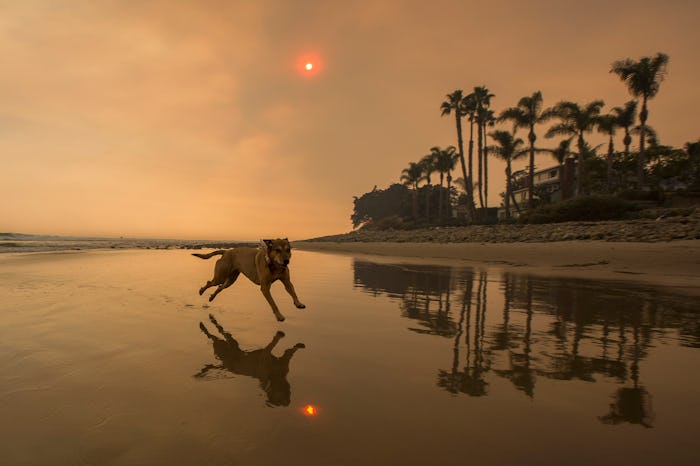Life

Here's How To Keep Your Pups Safe If You're In An Area Affected By Wildfires
Wildfires are raging across the country, and this is turning out to be yet another deadly season for the blazes. Anyone in the affected areas can feel the oppressive weight of the poor air quality looming over them like a dirty, decrepit blanket, and they worry about their elderly and their young for good reason. But we often overlook how it might affect our four-legged family. The smoke from the wildfires affects them as much as it affects us, so it's important to consider how wildfire smoke and dogs can impact your best friend so that you can protect them.
The canine system is pretty different from humans in a few key ways, according to The Journal of Physiology. Their lungs are more sensitive than ours because their lungs are designed to be running and hunting — they are built for performance, essentially. Ours are built for maintenance of homeostasis and the occasional rough and tumble. That means that their lungs are going to absorb more particulates and process more matter because of the way they're taking it in. This translates to the whole of their cardiac function, noted the journal. Therefore, the smoke from the wildfires could start affecting your dogs even before you notice the problem.
Unfortunately, dogs aren't the best reporters when it comes to their comfort. Sure, they'll push their bowl at you, or plop their head on your lap until you give them scratches, but they can't exactly say, "Hey, Mom? My lungs feel kinda funny, and my panting feels off. Does it look off to you?" That's why we have to do what we can to prevent them from being exposed in the first place.
Rover.com wrote that you should keep your dogs inside as much as possible when there's an air quality alert in your area. Yes, they get that your dogs may act like maniacs if they're kept inside too long (looking at you, Vizslas), but, unfortunately, you're just going to have to suck it up and maybe put your dog on a treadmill or something; these conditions won't last forever. Keep their potty time to a minimum, and watch their behavior when they come inside. Raelynn Farnsworth, veterinarian at Washington State University's Teaching Hospital, wrote “Short walks are OK for healthy dogs for bathroom purposes, but unless longer walks are necessary, they should be avoided during air quality alert warnings. For dogs with airway, breathing, or cardiac compromises, a brief on-leash potty break is best.”
According to Aspen Grove Veterinary Care, the signs of smoke inhalation are subtle, but they're there. Some key things you'll look at are their eyes, their breathing, and their behavior, because those are usually pretty regular when your dog is healthy. The website noted that severe coughing, red, inflamed eyes, depression, weakness, difficulty breathing, throwing up, gagging, and foaming at the mouth are all potential symptoms of smoke exposure. Honestly, what you need to know about dogs and wildfire smoke is that it happens fast, and often inhalation happens before you notice the potential danger.
The veterinarians at Washington State University noted that it's also crucial that pets have access to clean, abundant drinking water at all times, especially when the air quality is poor.
Keep your dogs safe by limiting their outdoor time, keeping them indoors when the smoke is oppressive, and watching them closely. No one wants their dogs to suffer, and it's terrifying to know how quickly it can happen. If you notice any of the symptoms of smoke inhalation, get your dog to the vet immediately, because it's a potentially deadly situation.